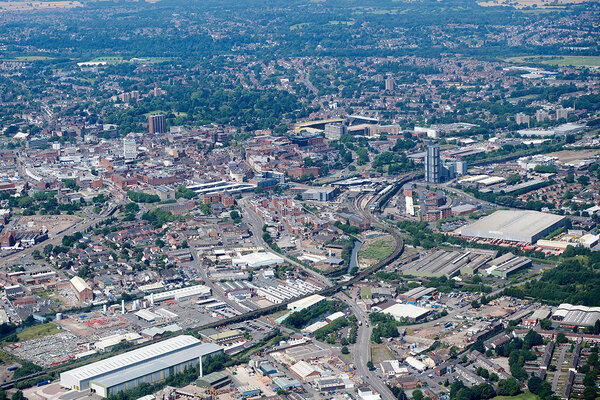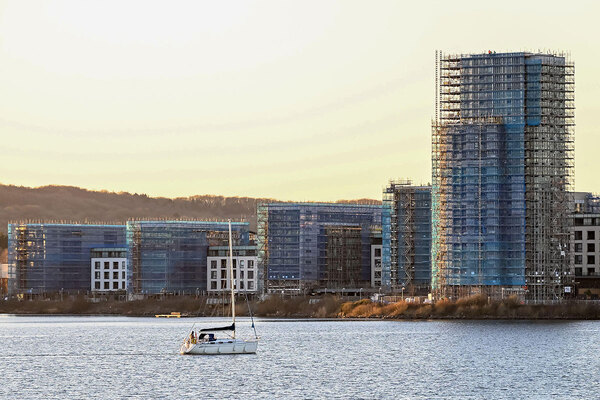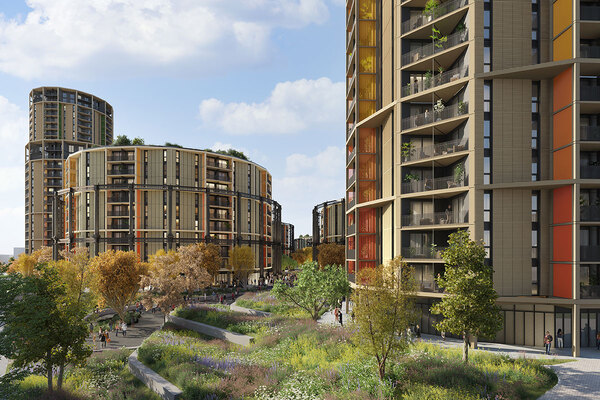Dispatches from the Conservative Party conference 2022
This week, the Conservative Party arrived in Birmingham to host its annual conference. Grainne Cuffe reports on all things housing
“These are stormy times,” said new prime minister Liz Truss in her speech on the final day of the Conservative Party conference. And she’s not wrong, not least within her own party.
The surreal situation in which she finds herself was aptly introduced at the entrance to the conference secure zone in Birmingham this week: the theme tune to The Benny Hill Show being blasted out by protesters.
Walking on to the stage to M People’s 90s classic Moving on Up – without permission it seems – and promising to “build a new Britain for a new era” was bold, given the circumstances.
Responding to a revolt in her party, Ms Truss has U-turned on the plans to scrap the 45p rate of tax, but not before the pound plunged against the dollar and the Bank of England had to step in to salvage pension funds.
In his own speech on Monday, chancellor Kwasi Kwarteng admitted his economic plan caused “a little turbulence”, but said this government “gets it” and is “listening”. This will not mean much, though, to the people facing huge hikes in their mortgage repayments.
In fact, both the prime minister and chancellor appeared to put the blame elsewhere during the conference. Most astonishingly, Mr Kwarteng appeared to put the issues with his Mini Budget down to “pressure” following the Queen’s death.
He has since promised to publish his fiscal plan early. But there has not been any clarity on exactly when yet.
Despite this and the U-turn, the Conservative revolt remains in full swing, including from within Ms Truss’ own cabinet. The prime minister has so far refused to rule out a cut to benefits, but Penny Mordaunt, leader of the commons, said to Times Radio that benefits should rise with inflation.
All that said, among all the chaos there were sessions on housing, which included voices from the sector. Below, Inside Housing takes a look at some key issues discussed at the Conservative Party conference 2022.
The housing crisis
“The party that solves the problem of housing in this country, not just for aspiring buyers but also at the social end… will be the party that wins lots of elections in a row, and will deserve to,” Liam Halligan told a room full of Conservative MPs on Sunday.
Speaking at a panel looking at building greener and more affordable homes – called ‘Too hot to handle? Ensuring greater and greener housing’ – the economist, journalist and author said that people aged 25 to 34 are less likely now to own their own homes than anytime since the 1930s.
Mr Halligan, who wrote a book called Home Truths about the chronic shortage of housing in the UK, said younger people are paying more for their rent and mortgages – “if they’ve got them” – than in nearly a century.
“If the Conservative Party wants to exist properly in 15 to 20 years’ time, it simply must solve this problem,” he said.
This was not Mr Halligan’s only appearance. He also spoke at a session called ‘How to solve the social injustice of the housing crisis’, where he was joined by Geeta Nanda, chief executive of Metropolitan Thames Valley and chair of the G15, which hosted the session along with the Centre for Social Justice.
Mr Halligan said there are 1.2 million people on waiting lists for social housing. He put this down to land affordability.
“It strikes me that any civilised country needs to look after the most vulnerable and the fact that we are building so few social homes, that’s why there’s so much overcrowding, that’s why there is so much homelessness,” he stated.
Sally-Ann Hart, MP for Hastings and Rye, said she believes in homeownership, but “we shouldn’t forget about or ignore the necessity of the safety net”, referring to social housing.
She added: “Building new affordable homes for ownership and rent is a vital policy, and I absolutely think that we have got to look at this.
“The shortage of affordable housing limits families and individuals choices about where they live, often forcing lower income families into substandard, mostly private rented housing that affects their ability to meet other expenses such as food and eating and often forced to trade off between those basic needs.”
Ms Nanda called for “ambition” from the government to see housing as infrastructure that needs long-term funding.
“We have had an affordable homes grant programme, which has allowed us to build new homes, but it was £9.4bn as against £16.5bn for Help to Buy.
“So the need to really improve the supply… is really, really important,” she stated.
Ms Nanda said social landlords are under significant financial pressure, including because of decarbonisation programmes and the proposed rent cap. “We can only do so much,” she explained.
“If we’re unable, if we’re taken out of the equation as the builders or developers of new homes because of these other headwinds… who will do it?”
James Prestwich, director of policy and external affairs at the Chartered Institute of Housing, tweeted that his main takeaway from the conference “would be a genuine acceptance by the Conservatives of the importance of social housing as crucial to a functioning housing system”.
“That is a good thing, but [there] must also be acceptance that housing doesn’t exist in isolation and there is an unarguable need to uprate benefits in line with inflation to protect those worst affected by the cost of living crisis,” he said.
There is no argument that the UK is facing a housing crisis. Indeed, it would be difficult to find any politician that would publicly say “we don’t need new homes” (in certain areas).
One of the key approaches for Conservatives appears to be looking at reforming the planning system and getting rid of “red tape”. Whether this will unleash the level of housebuilding needed in the country, remains to be seen.
Planning concern has its ‘own WhatsApp group’
“It’s a Stalinist approach,” said one ruffled Conservative member from the audience of a session called ‘Too hot to handle? Ensuring greater and greener housing’. He was referring to the current planning system.
Planning was a significant talking point when it came to housing at the conference. The system, among other things, was described as “complicated”, “burdensome”, “grubby” and “corrupt”.
Proposals for planning reform have been around for a while. In 2020, Boris Johnson’s government published the Planning for the Future White Paper. The then-prime minister said he was replacing England’s post-war planning rulebook with a radical new system that was “long overdue”.
However, former housing secretary Michael Gove announced in September last year that the plans were being put on hold to tackle levelling up – which may or may not be put on hold by the new administration.
In his (less than) Mini Budget, Mr Kwarteng announced that there is a new planning bill in the works. New housing minister Lee Rowley told Inside Housing that we can expect a statement on planning in the coming weeks.
He said the government “is keen to see where we can make [planning] processes quicker and easier”.
But some Conservative voters’ views on planning seem to be in conflict with cutting red tape. On the one hand, there is a desire to make it easier to get planning permission, on the other is a desire to make it easier to block it.
Speaking at the session on greener homes, Ruth Edwards, MP for Rushcliffe, said: “There is almost no other subject on earth more likely to cause Conservative MPs to don their armour and line up battalion-style for battle than the issue of housing and planning.”
Planning concern has its own WhatsApp group, she revealed.
Ms Edwards said the planning system has “lost its legitimacy with the public and it’s not delivering what we need”.
She said Rushcliffe constituents feel “under siege from development”.
“It’s not that they think we shouldn’t have new houses, of course we need to build new houses, but they do feel that their voices are being ignored by the planning system,” she explained.
Ms Edwards proposed “reforms to the Infrastructure Levy, commencement notices, and strengthening local and neighbourhood plans in the Levelling Up [Bill]”.
“And we also need the prime minister to end top-down housing targets,” she added. Luckily for her, the scrapping of the 300,000-home-a-year target appears to be full steam ahead, along with getting rid of Section 106.
But for social landlords, both of those plans will be a concern over the potential loss of affordable housing. Inside Housing’s exclusive data found that a total of 49% of the homes completed by housing associations in 2021-22 were acquired via Section 106.
Ms Nanda warned at the conference that the government must be “aware of the consequences” of getting rid of it.
Concerns around retrofitting in terms of planning were also raised during the session.
Martina Lees, senior property reporter at The Times and The Sunday Times, said the government is “doing almost nothing to insulate our homes”. She added that low-carbon homes need to be mandated and “exempt from the normal planning red tape”.
“It costs five times more to retrofit a house than to build it properly in the first place. But last year, only 2% of new homes built had the top energy rating of A. Since 2015, we’ve built 1.5 million homes we will need to retrofit,” Ms Lees explained.
Mr Rowley told Inside Housing that planning is a “hugely sensitive area” and that the government “wants to strike a balance” between making planning easier and making sure people’s voices are heard.
“I’ve always found on a general level that planning becomes very, very difficult very quickly if you don’t have upfront conversations with individual localities early,” he said.
Only time will tell, but given that the planning bill has just been announced, the wait may take a while.
Levelling up?
“It’s not a U-turn, it’s a change of direction,” Lee Anderson, MP for Ashfield, told ITV News when asked about the reversal of the 45p rate of tax cut. One might wonder if the same can be said about levelling up.
Levelling up – investing in areas that historically have seen a lack of it – was a key element of Mr Johnson’s 2019 campaign and was one of the things that got previously Labour supporting strongholds to vote Conservative for the first time.
Mr Johnson said it was the “defining mission” of his government. The housing department was renamed (again) and a Levelling Up and Regeneration Bill is now on its way through parliament.
However, we now have a new prime minister and cabinet. In his speech, Mr Kwarteng made no mention of the bill and there have been rumours that it could be scrapped altogether. That said, Mr Rowley told Inside Housing that he anticipates the bill will go through the normal parliamentary process.
What we will likely see instead of the previous levelling-up agenda is a much more devolved approach, with plans for less government intervention and more powers to local leaders.
Andy Street, mayor of the West Midlands, was asked directly during a session on devolution – a key commitment in the levelling-up agenda – if he believed plans for it are still going ahead.
He said his “honest answer” was that he was hearing the “right things from the prime minister” but “had to see action following through”.
One element of the government’s plan is the recently announced “Investment Zones”. If successful in their application to the government, local authority areas could benefit from lower taxes and relaxed planning rules to incentivise investment.
But Mr Gove said in a session during the conference that he had a “gentle worry” that “there seems to be an emphasis more on some interventions and not the full suite”.
“But again, I think we have to give the new government a little bit of time to spell out over the next few weeks exactly how the opportunity zones will work,” he said.
His gentle worry was echoed by Brigid Jones, deputy leader of Birmingham City Council, at the session on devolution. She said to attract investment, more is needed than just low tax zones, such as better infrastructure so that businesses can operate in poorly connected areas.
The skills dilemma
During a session on the ‘great housing debate’, Fiona Fletcher-Smith, chief executive of L&Q, said the rate of inflation was keeping her “up at night”. This is because of the impact it is going to have on the large social landlord’s ability to provide services for its tenants.
Another concern for her - which was also raised in several sessions on housing – was skills, or a lack thereof, in the housing sector.
Ms Fletcher-Smith said the issue of construction skills was not only hindering new development but fixing the homes already in existence.
“We’ve always suffered from a shortage of construction [skills] and we haven’t moved fast enough as a country to replace that labour that we lost once we Brexited,” she explained.
“But, for me, a subset of construction that’s even harder to recruit to is repairs and maintenance… because to work in a repairs maintenance company, you also need to be pretty good customer service and that isn’t always the case,” she added.
In the same session, Lewis Sidnick, director of corporate affairs at the National Housing Building Council (NHBC), said that very few young people want to work in the housebuilding sector and that perception needs to improve.
He explained: “If we’re about to enter a very difficult period of supply… we need to address some of the big structural problems within the market that have been here for quite some time.
“And one of those is really skills and young people, and trying to get more people into the housebuilding industry and working in the sector.”
Mr Sidnick added that the level of interest is “very low and very poor”. He said the NHBC has been trying to turn the tide by putting on training and launching training hubs to get people more “interested and engaged” in the sector.
The need is acute. Even if we had the smoothest planning system in the world, backed by unlimited government funding, we still would not be able to fix the housing crisis if there are not enough people to build the things.
The issue of skills in the construction sector is not a new problem, what was said in this session would probably have been said a decade ago.
However, it is clear that now, in a post-Brexit world, it is more important than ever to grasp the nettle and put in place long-term programmes to develop the next wave of construction talent. This is crucial not only for the construction sector but also the housing crisis.
Sign up to our Best of In-Depth newsletter
We have recently relaunched our weekly Long Read newsletter as Best of In-Depth. The idea is to bring you a shorter selection of the very best analysis and comment we are publishing each week.
Already have an account? Click here to manage your newsletters.














